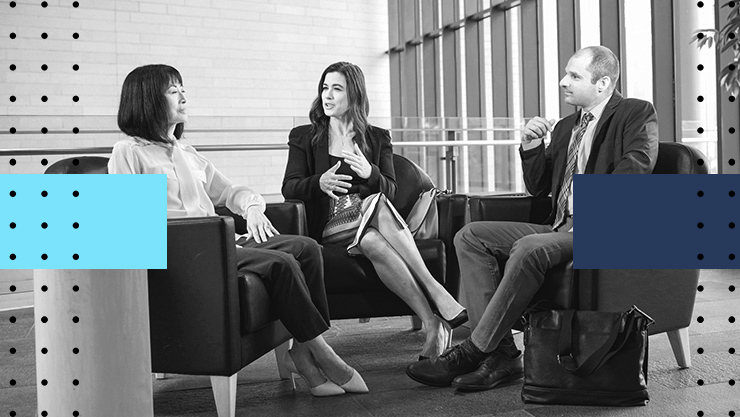
Innovative Culture and AI: Digital Transformation in the City of Kelowna
with Jazz PablaThe former CIO of the City of Kelowna in Canada shares how he and his team used Generative AI to improve City services.
Episode summary
As the CIO for the City of Kelowna in Canada, Jazz Pabla led a small team charged with delivering digital services and meeting the developing needs of a growing city. He meets host Olivia Neal to explore how the team used Generative AI to test new approaches to service delivery, to support developers, and to create a culture of innovation that attracts and keeps talented people.
Innovative Culture and AI: Digital Transformation in the City of Kelowna
The City of Kelowna
Pabla explained “Kelowna is nestled just about four hours northeast of Vancouver, in British Columbia. And we’ve got about 150,000 residents. 50% of Kelowna is agricultural land. The other 50% is residential.”
The City of Kelowa employs around 1,000 people, and Pabla described his team “There’s about 40 that work in IT. And we have different types of skill sets, from GIS to data to software, AI obviously. And cybersecurity infrastructure as well, which is very critical on the day-to-day side of things.”
“It’s a fast growing city, one of the fastest growing cities in Canada. And so, it’s a challenge for us to grow with it, and technology is definitely a key contributor to managing that sustainable growth.”
Pabla shares the advantages of working with a smaller team “We’re aligning ourselves to what’s the best possible citizen experience that we can give. And then once we’re focused on the citizen experience, what’s the best staff experience? And then sometimes those innovative technologies, you can’t wait two, three years to implement them. They need to be here now because in your private life, you’re seeing them every day. That’s the great thing about a team of our size is you can shift when you need to shift.”
Impact of COVID on digital transformation
Pabla shared that the need to convey information 24/7 during COVID was a catalyst for progress on digital transformation and starting to use chatbots to provide people with the information they were seeking. “The feedback we got from those bots was people wanted to consume city services way beyond COVID. And so, we started to realize, okay, there’s something else here. This is a group of citizens, a majority of citizens, who don’t want to come into City Hall, who want to consume City Hall data. What’s the best way we can give it?”
“And so, we started to focus on these digital assistants and our web experience, and then everything just accelerated 10x as soon as generative AI was introduced into those digital assistants.”
“This is the future of government, this digital assistant world where this information is in front of citizens’ hands whenever they want it, not when you’re available, when they’re available.”
Building data quality to mitigate risk
Pabla explained that in his experience “the biggest risk when you do something like that is around the quality of data you have out there.” He shared the example of iterating the approach to providing information on parking rates. In this case the team found that the data contained “addendum after addendum after addendum, where you’ve got old documentation, and you’ve got two versions of a bylaw, all that sort of all of the above, you got to clean that up, and that was our biggest learning.”
In addition to focusing on data quality, Pabla emphasized the importance of testing and using an iterative approach, to build quality before release.
Seeing the benefits of investment
Pabla discussed the return on investment of using AI within digital transformation. “There’s two sides to it. So if you focus on the citizen side and that interaction coming in, we know there’s an industry set standard on the amount each telephone call costs. And we also know that AI, according to Gartner, is around that 75 cents to $1 per call. So you know that there’s this massive saving in cost. So we can quantify that right away.”
“The ability for AI to scale up and answer the phone or, service request from the citizens, no human can do as much as one interaction with a bot can. So you’re looking at a significantly reduced cost to scale and provide the service.”
Pabla outlined the increased use of digital assistants as an example of increasing scale, “In 2022, there was 12,000 questions asked in our digital assistants, across all our digital assistants, and about 1,500 of those were voice. Pretty good start. 2023, we’re at over 105,000 questions asked, and 79,000 of them came in over the phone.”
Pabla then explained how they have identified opportunities internally “We’ve done a digital opportunity assessment. And so, we interacted with frontline staff. What are you doing, how are you doing it, and how long does it take? And what do you see as a better option. And so, we got feedback right away on those things that were 200,000 to 300,000 hours of potential automation time that we could save.”
“And so, the savings are in the millions. And that’s because the people that are close to the ground are describing some of the pain points they have with processes. Well, that turned into our backlog and our opportunity, and now we just automate that.”
Using AI to support developers
Pabla outlined some of the benefits of Generative AI for his team in modernizing legacy infrastructure and supporting development. He explained “AI has done a great job of leveling up those developers that are learning, so things like GitHub Copilot, and these repositories that are out there, leveraging that to help write code.”
“It’s not just about app development. This is also very real in our data and GIS teams as well. And so, you’re seeing people that may not have the technical experience in coding using these types of technologies to help code quicker.”
Pabla shared the example of a business systems analyst who had taken a legacy database, and converted it into a new app with a chat experience and structured data “Six minutes; then it was done.”
“And so, now you’re seeing apps being created on the fly. You have your data. You know what the data is. You need to refactor that database. You need to create a new front end. You need to make it chat friendly. Well, generative AI just accelerates that conversation. So I think that day, they did like two or three, just to see how it would work, and they were just blown away.”
“So it’s completely changed how we look at some of our legacy systems and how we go to market a lot quicker. And this is what you’re going to see, I think, just generally in the market, forget about government, just generally in the market, people with ideas being able to go to market quicker on their ideas, and being able to test things out. It’s no different for government.”
Creating an innovation culture that attracts and retains talented people
Pabla discussed the importance of creating an innovative culture within the city. The city had one of the lowest turnover rates in IT during the pandemic, and Pabla attributed this to the innovative culture “This is what’s going to be required to retain this talent going forward. If you’re in government, and you need to bring in that next generation of worker, but you’re not willing to move forward, they’re going to move on. They will 100% move on.”
He shared that opportunities to use AI are now being brought forward by people from different teams “It’s very infectious and contagious, and once it starts to get going, it just takes off. And there’s no turning back now. The City of Kelowna is a city that embraces AI.”
Supporting outcomes across municipalities
Pabla emphasized the importance of learning from others and sharing knowledge. “We love helping as well. We actually gave away at no cost to municipalities our permitting solution. So we went with the Explore Your Property. It’s a generative AI on the Microsoft stack. We documented it all, all our journeys, everything, all the questions that we got, and we just gave it away to cities for free. We feel that there’s a responsibility for governments to work together to provide homes over people’s heads. And if we can contribute to that positive energy, we’re in.”
Pabla shared advice for others wanting to replicate Kelowna’s approach.
“Get to know your technology partners well. So if you’ve got Microsoft, Microsoft partners, or whoever you’re working with, interacting with them and understanding what they can do, they’re there to help. Microsoft’s been great for us and all our partners along the way.”
“My advice to anybody is just start with something. It’s progress over perfection. I can’t stress enough. I’ve been at the city of Kelowna for four years. And we thought it was going to be a lot more difficult than it maybe is. Yes, there’s learning curves. Yes, there’s things to try out. But those wins, as soon as they start to pick up, it just takes off, and it’s not that difficult. It really isn’t.”
To find out more:
Listen to this episode on any of these podcast platforms:
About the Center of Expertise
Microsoft’s Public Sector Center of Expertise brings together thought leadership and research relating to digital transformation in the public sector. The Center of Expertise highlights the efforts and success stories of public servants around the globe, while fostering a community of decision makers with a variety of resources from podcasts and webinars to white papers and new research. Join us as we discover and share the learnings and achievements of public sector communities.
Questions or suggestions?










